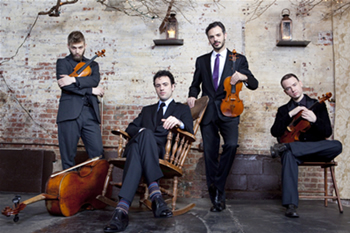Tenor Anthony Dean Griffey, a native of High Point, NC, and an international opera star, became artist-in-residence at UNC in 2009; he is currently archaically called “professor of the practice” in UNC’s Music Department. The four-time Grammy winner is renowned for his interpretations of major operas by British and American composers such as Benjamin Britten’s Peter Grimes, André Previn’s A Streetcar Named Desire, and Carlisle Floyd’s Of Mice and Men. Griffey was scheduled to perform on the Carolina Performing Arts series last season but had to cancel because of illness. This well chosen program added four faculty string players – violinists Richard Luby and Leah Peroutka, violist Hugh Partridge, and cellist Brent Wissick – and soprano Terry Rhodes, department chairman, in addition to Griffey’s longtime superb accompanist Warren Jones. Jones was born in Washington, D.C,. but raised in NC.
John Dowland (1563-1626) was a great English Renaissance composer, singer, and lutenist best remembered today for his melancholy songs. He drew upon the popular consort songs and dances of the Elizabethan era. Griffey chose to explore a broader range in his selection of three songs. In “Come again,” the feverish swain pleads his love to a haughty maid. The etymology of the Middle English word “speed” is key to Dowland’s “What if I never speed,” in which the lover catalogs the many joys of love he may not experience should his proffered love not meet with success. “Fine Knacks for Ladies” was originally a four-part madrigal in the composer’s Second Book of Songs and Airs (1600). This comic and very witty number is in the form of a street seller’s song; it has a wonderful homorhythmic texture throughout all three verses.
Elizabethan texts are noted for their complexity and density. Griffey’s extraordinarily clear diction was evident throughout with distinct and vivid consonants and vowels. His warm tone was evenly supported across his wide vocal range. His tenor voice has a hint of baritone richness and was seemingly projected without effort. Jones accompanied the entire concert with the Steinway’s lid fully raised but scaled the keyboard’s dynamics across a remarkable range and with a broad palette of color. For the Dowland pieces, he managed to suggest a fortepiano if not a lute.
Jones spoke about both the neglected composer Charles T. Griffes (1884-1920) and the poet who is credited for the texts of Three Poems by Fiona MacLeod, Op. 11. Griffes was influenced by German and Russian Romanticism and is the most famous representative of American Impressionism. Critics regard Op. 11 as the peak of Griffes’ work in which he has begun to move away from accepted rules of tonality. Jones said Griffes set only contemporary poetry to music. McLeod was the pseudonym of William Sharp, an editor and poet, who used it for all of his lush, sensual texts based upon a primitive Celtic world. Jones brought out Griffes’ debt to French Impressionism in the bell-like extended introduction to the first song, “The Lament of Ian the Proud.” The composer’s adventuresome tonality was evident in the nervous keyboard introduction to the third song “The Rose of the Night.” All of the qualities of Griffey’s vocalism, described in the Dowland, were evident in the three Griffes songs, to which was added the ability to project dark, troubled emotions. This was true of the barely contained passion of the second song, “Thy Dark Eyes to Mine,” and the literally haunted third song.
Griffes’ early Barcarolle, from Fantasy Pieces, Op.6, No. 1, come from the period 1911-17, when the composer abandoned the German style and began experimenting with Impressionist techniques. It was a rare treat to hear the keyboard magic of Jones freed from his role as an accompanist.
The centerpiece of the concert, On Wenlock Edge (1909), Ralph Vaughan-Williams’ magnificent cycle of six songs for tenor, string quartet, and piano, was given after intermission. The setting of poems from A. E. Housman’s A Shropshire Lad reflects the composer’s year of study with Ravel in Paris. The accompaniment is full of harmonies associated with French Impressionism. Griffey’s interpretation has grown since CVNC reviewed his superb Music for a Great Space Performance in 2004 [https://cvnc.org/article.cfm?articleId=3894]. To what was already a deeply-moving rendition has been added a raw, deeply-emotional intensity. This was outstanding in the third song, “Is my team Ploughing,” a dialogue between a dead farmer and his friend. The last two songs, “Bredon Hill” and “Clun” were devastating visions of mortality. What a contrast was the playful and short and sweet fourth song, “Oh, when I was in love with you.”
Griffey’s music department string colleagues, with Jones’ shimmering keyboard, provided superb accompaniment. The opening title song’s storm was beautifully evoked and the muted strings in the third and fifth songs were gorgeous. Jones’ extended solo introduction to the second song “From Far, from eve and morning” was magical.
Music Department chairman and soprano Terry Rhodes joined Griffey and Jones for mostly humorous show tunes. Rhodes and Griffey stormed on stage in character for Irving Berlin’s “Anything You Can Do” and they brought the same high-jinks to a spirited “Let’s Call the Whole Thing Off,” by George and Ira Gershwin. In between, Rhodes took a solo turn with Vincent Youmans’ “Without a Song,” in which she gave her considerable all. Before singing Harold Arlen’s famous “Over the Rainbow,” Griffey offered a dedication to two important women in his life, his high school choral director, Mrs. Rachel Dunn, who forced “a chubby, shy boy” to sing a solo before the entire school, and his mother, Joyce Griffey, “who never told him to shut up.”
The hearty standing ovation was rewarded by Griffey’s eloquent rendition of “Sing a Simple Song,” a 1968 song by the soul/rock group Sly and the Family Stone.
Note: The tenor returns to North Carolina in April for a Greensboro recital presented by Music for a Great Space. See our calendar for details.












